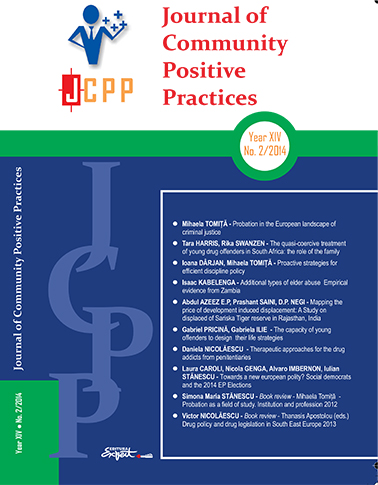THE QUASI-COERCIVE TREATMENT OF YOUNG DRUG
OFFENDERS IN SOUTH AFRICA: THE ROLE OF THE FAMILY
THE QUASI-COERCIVE TREATMENT OF YOUNG DRUG
OFFENDERS IN SOUTH AFRICA: THE ROLE OF THE FAMILY
Author(s): Tara Harris, Rika SwanzenSubject(s): Criminal Law
Published by: Asociatia pentru Dezvoltare si promovare socio-economica Catalactica
Keywords: Quasi-coercive treatment; youth offenders; drug abuse; criminal justice; person-inenvironment ;
Summary/Abstract: The adoption of restorative justice principles in the treatment of youth offenders offers the opportunity and challenge of providing evidence-based guidelines for treatment programmes (as opposed to punitive measures). This paper aims to add to the body of growing literature to support treatment of youth offenders within the community. A link is made between drug abuse and criminal behaviour in young people and then placed within a legal context that enables the choice of quasi-coercive treatment. To highlight what this means for the family who will take responsibility for alternative sentencing of young offenders, the person-in-environment framework is used to show the dynamic working of environment systems and social roles, as well as attachment theory to show the effect of relationship quality of the parent-child dyad. The paper ends with a summary of aspects to consider when a focus on the family is taken when alternative sentencing is considered.
Journal: Jurnalul Practicilor Comunitare Pozitive
- Issue Year: XIV/2014
- Issue No: 2
- Page Range: 11-28
- Page Count: 17
- Language: English

